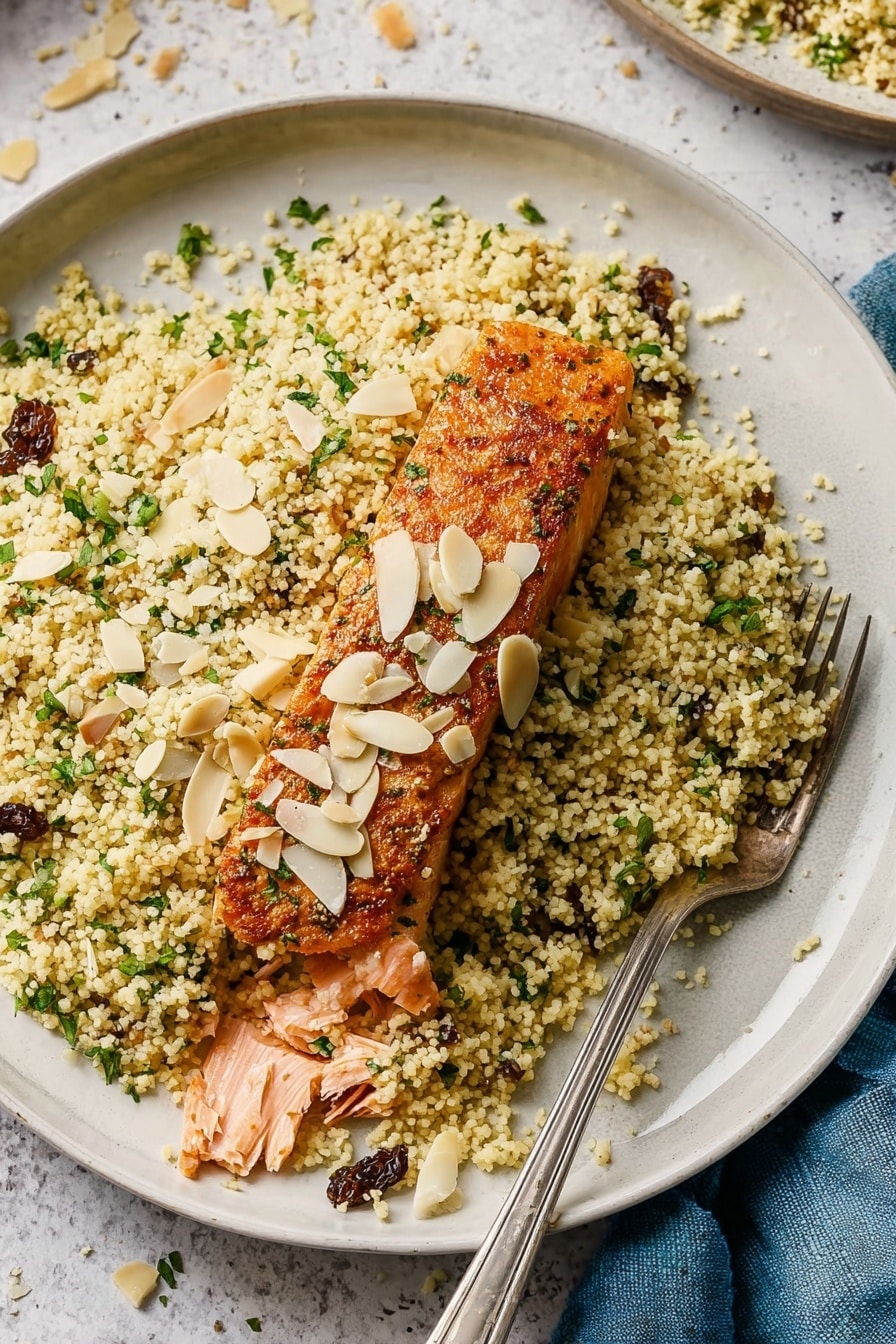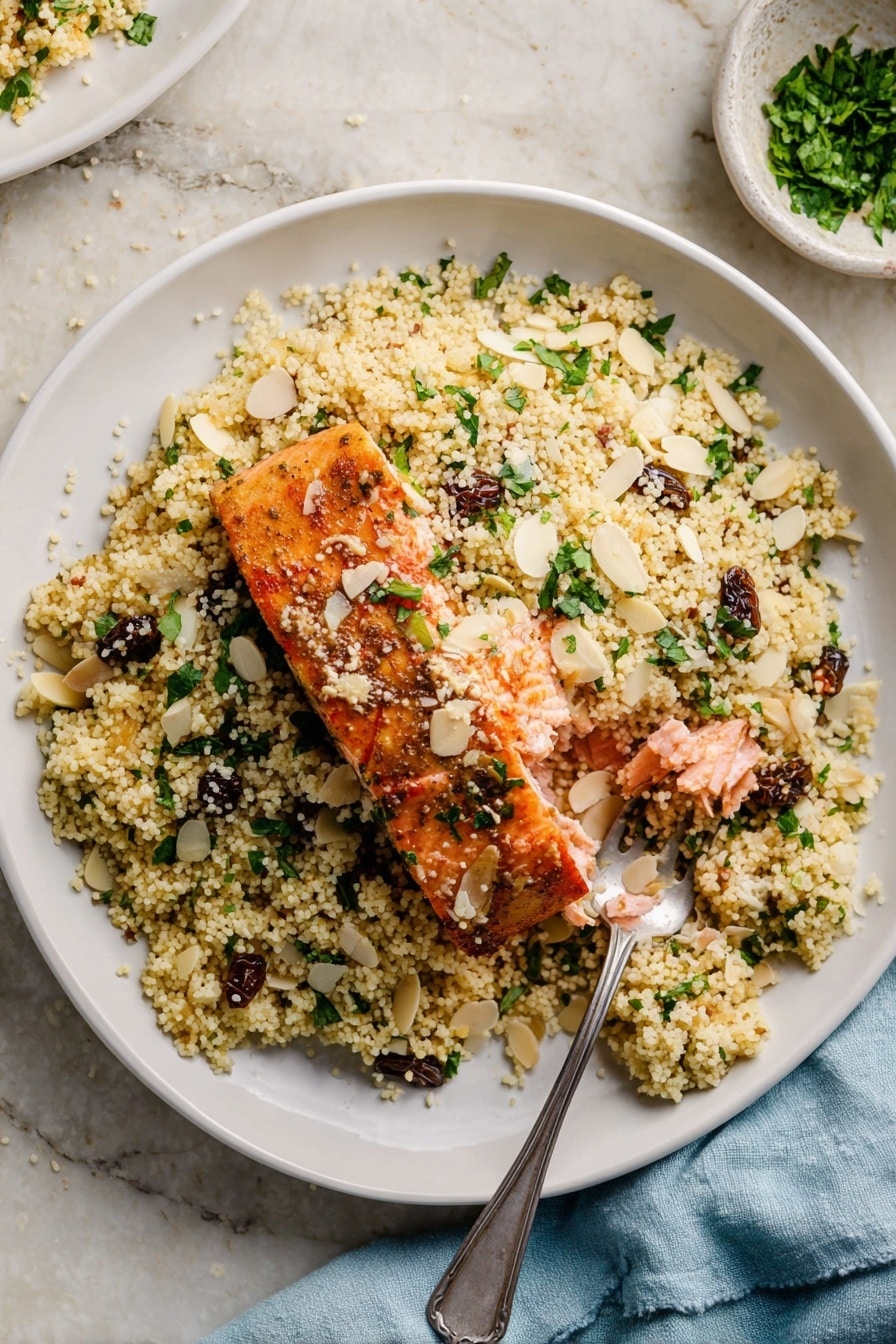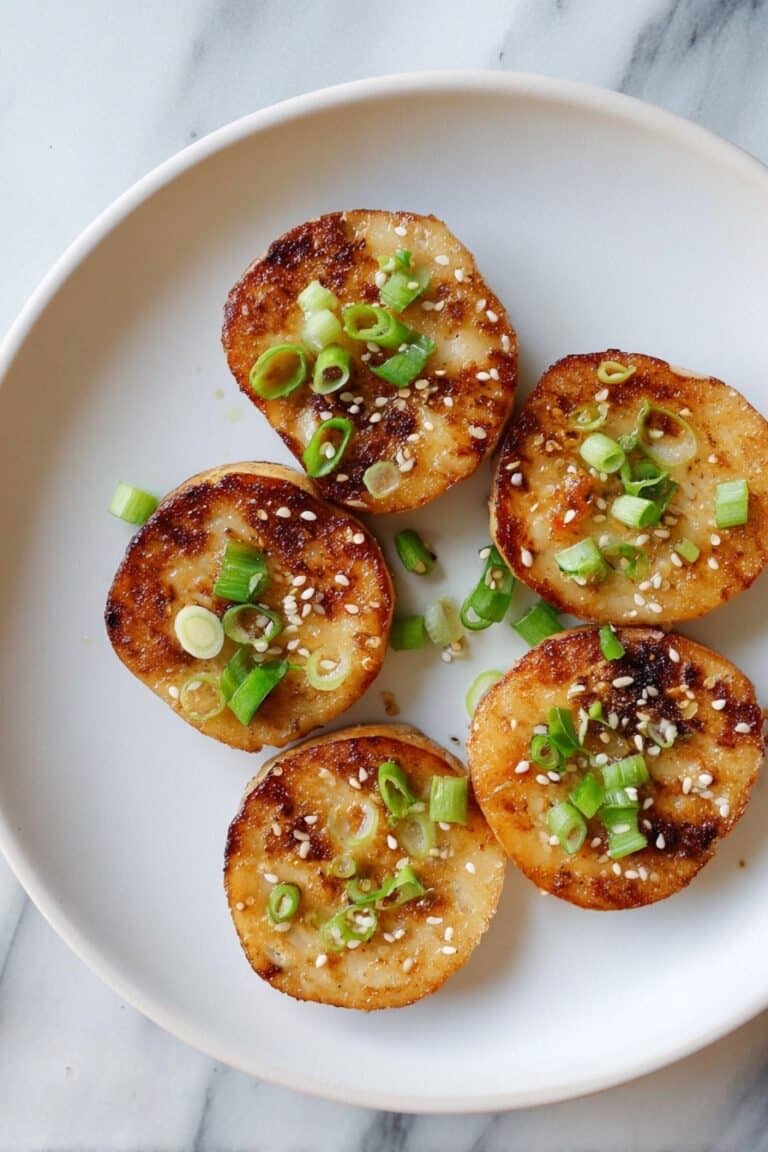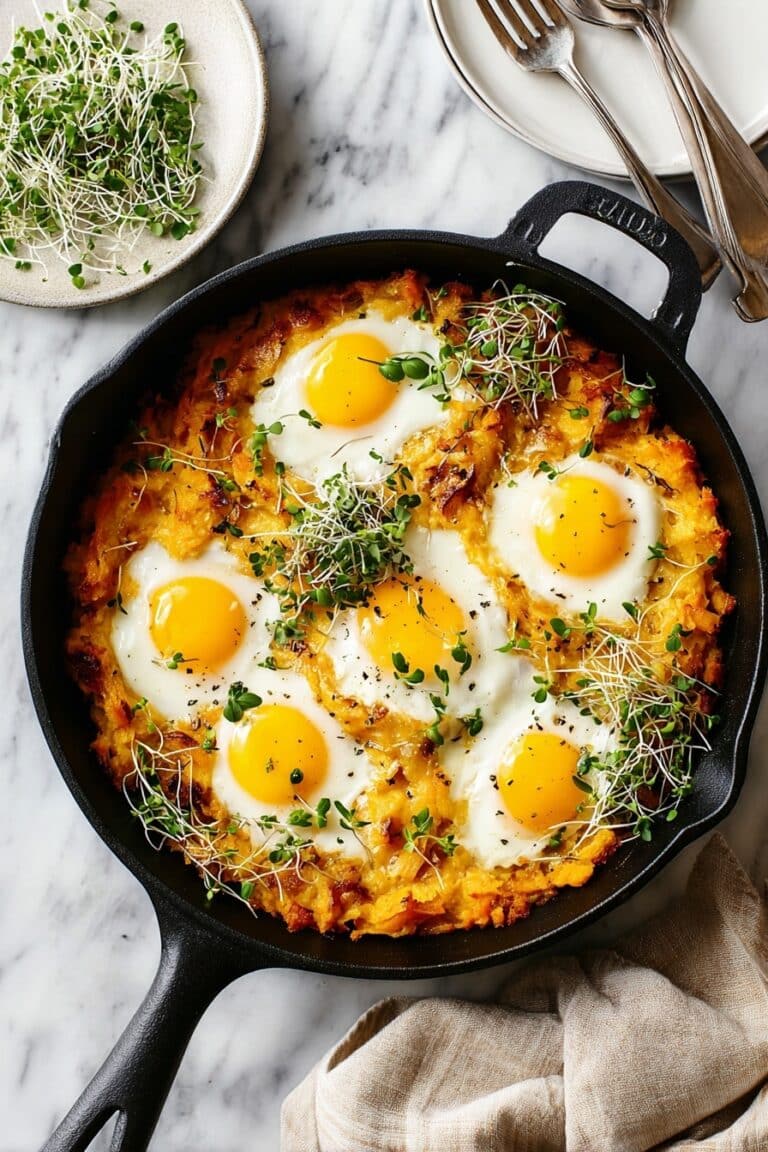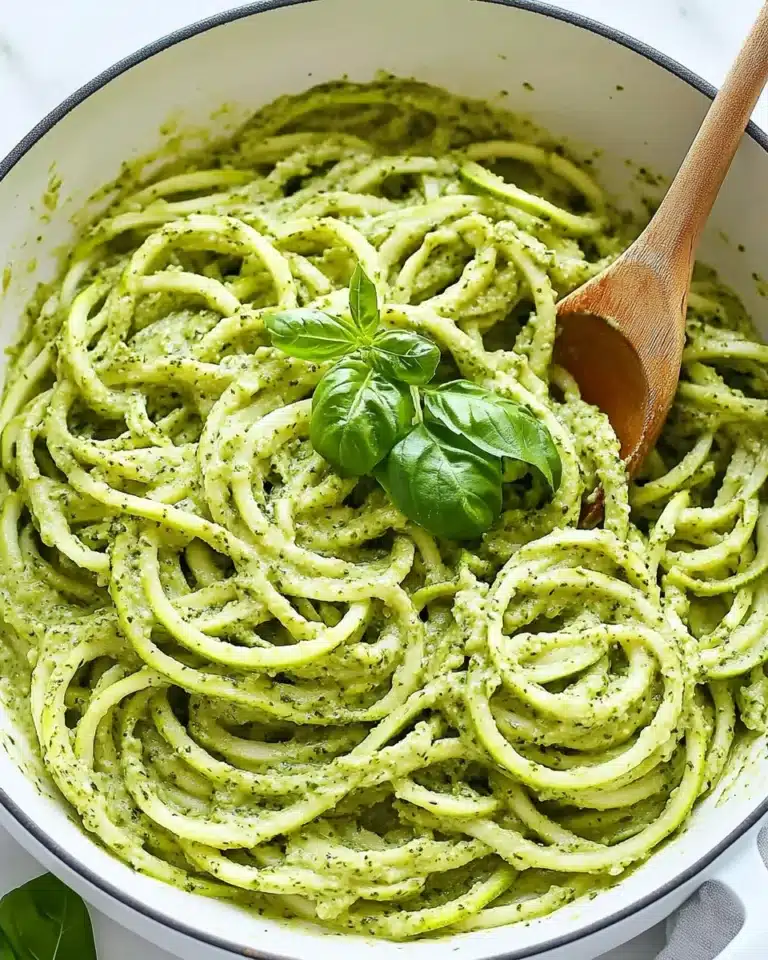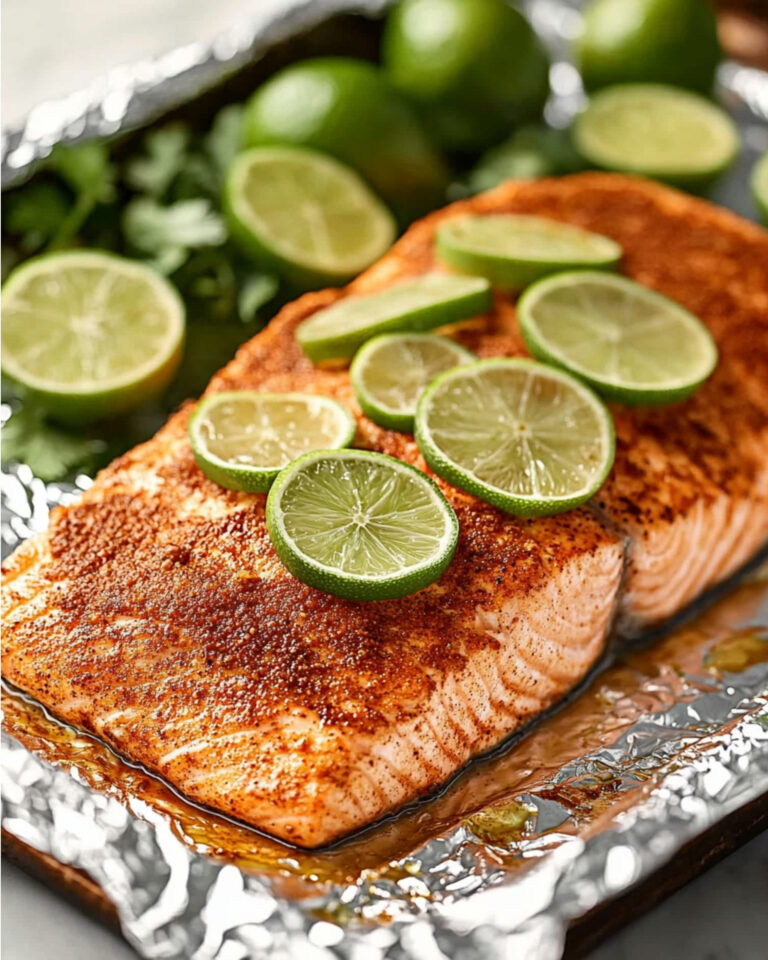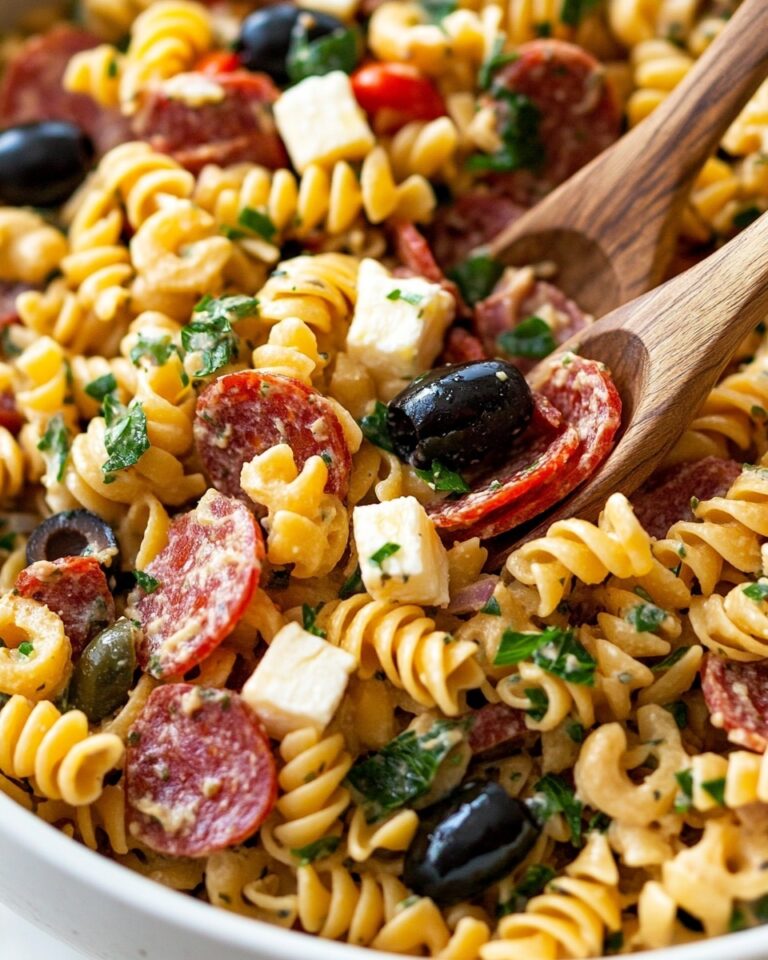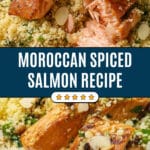If you’re looking for a dinner that hits all the right notes—flavorful, fast, and feels special—then this 30-Minute Moroccan-Spiced Salmon and Couscous Recipe is going to be your new go-to. It’s packed with aromatic spices, tender salmon, and fluffy couscous that’s brightened up with lemon and studded with almonds and raisins. Honestly, I love this recipe because it’s perfect for busy weeknights but doesn’t taste like just another quick meal. Stick with me here—I promise you’ll be making this on repeat.
Why You’ll Love This Recipe
- Quick and Easy: You can have a wholesome, restaurant-quality meal on the table in just 30 minutes.
- Bold Moroccan Flavors: Ras el hanout spices give fragrant warmth without overwhelming heat.
- Balanced Texture & Taste: The flaky salmon contrasts beautifully with the nutty, slightly sweet couscous.
- Family Favorite: My family goes crazy for this one, and I bet yours will too!
Ingredients You’ll Need
Getting your ingredients right is the first step to nailing this 30-Minute Moroccan-Spiced Salmon and Couscous Recipe. Each element plays a part—from the spice blend that elevates the salmon to the citrus that brightens the couscous.
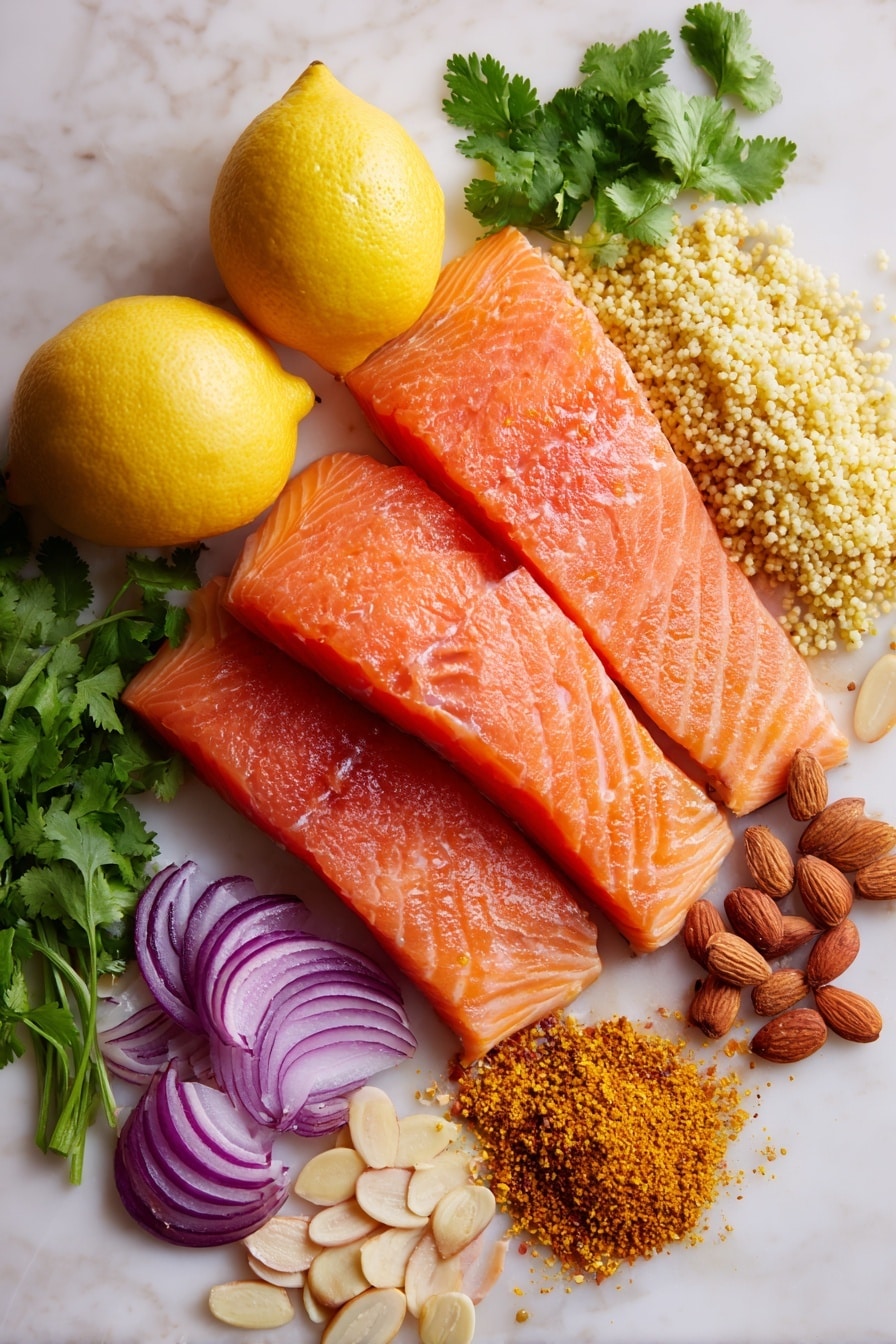
- Salmon fillets: Whether skin-on or off, firm, fresh fillets work best for that perfect flaky texture.
- Extra virgin olive oil: Adds richness and depth without overpowering the other flavors.
- Lemon (zested and juiced): Fresh lemon juice gives brightness; zest adds a subtle intensity.
- Ras el hanout: This Moroccan spice blend is the star—warm, earthy, with hints of nuttiness and mild sweetness.
- Kosher salt: Essential for seasoning and enhancing the natural flavors.
- Shallots: Their mild, sweet onion flavor complements the spices beautifully.
- Garlic cloves: A little pungency adds depth to the couscous base.
- Moroccan couscous: The small granules cook quickly and soak up all the flavors.
- Chicken or vegetable broth: Warming the broth helps the couscous cook faster and more evenly.
- Sliced almonds: Toasty crunch that contrasts nicely with the softness of the couscous and fish.
- Fresh cilantro: Adds that fresh, herbaceous pop at the end—don’t skip it!
- Raisins or dried cranberries: Sweet bursts that balance the spices and savory salmon.
Variations
I love how flexible this 30-Minute Moroccan-Spiced Salmon and Couscous Recipe is. Over time, I’ve tweaked it depending on what I have on hand or who I’m cooking for. Feel free to make it your own!
- Variation: Swap the salmon for chicken breasts or tofu if you prefer—just adjust cooking times accordingly.
- Variation: For a vegan twist, use plant-based salmon alternatives and vegetable broth, and omit the fish.
- Variation: Toss in chopped roasted vegetables like bell peppers or zucchini to add color and more veggies.
- Variation: Try pistachios or toasted cashews instead of almonds for a different nutty crunch.
- Variation: Add a pinch of cayenne if you want a subtle spicy kick to the marinade.
How to Make 30-Minute Moroccan-Spiced Salmon and Couscous Recipe
Step 1: Prep and Marinate the Salmon
Start by preheating your oven to 350°F. Pat the salmon fillets dry—this is crucial; it helps the spice mix stick better and ensures a nice crust. In a small bowl, whisk together olive oil, lemon juice, ras el hanout, and kosher salt. Brush this mixture over the top of each salmon fillet. Pro tip: don’t skip the brushing step—it’s where the magic happens, helping flavors penetrate and keeping the fish juicy.
Step 2: Bake the Salmon
Place the salmon on a parchment-lined baking sheet and slide it into your preheated oven. Bake for about 12 to 15 minutes, depending on thickness. I usually check the internal temperature to hit around 120°F for a perfect medium-rare finish that flakes easily without drying out. While that’s going, it’s a great time to make the couscous. Multi-tasking? Yes, please!
Step 3: Cook the Couscous Base
Heat olive oil in a saucepan over medium-high heat until shimmering, then toss in the thinly sliced shallots. Stir occasionally until soft and fragrant, which usually takes about 2 to 3 minutes. Add your finely chopped garlic and cook for just one more minute—don’t let it brown or it’ll get bitter. Next, stir in the couscous so it starts to soak in those flavors.
Step 4: Add Broth & Let It Steam
Pour in the warmed chicken or vegetable broth, stir gently, then cover tightly with a lid. Remove the pan from the heat and let it sit, undisturbed, for 5 to 7 minutes. This step allows the couscous to absorb the liquid, plumping up beautifully. Use a fork to fluff it up before moving to the next step—this keeps the couscous light and airy.
Step 5: Finish the Couscous and Assemble
Now for the finishing touches! Fold in the lemon zest, additional fresh lemon juice, crunchy sliced almonds, chopped cilantro, and those sweet raisins or dried cranberries. Give it a good stir and taste for seasoning—you might want to add a bit more salt or a tablespoon or two of olive oil to add richness. Plate some couscous, top with the golden baked salmon, garnish with extra cilantro if you like, and you’re ready to impress!
Pro Tips for Making 30-Minute Moroccan-Spiced Salmon and Couscous Recipe
- Dry Your Salmon Well: Patting the fillets dry ensures the spice rub sticks and the texture stays flaky, not soggy.
- Warm Your Broth: Using warm broth to cook the couscous speeds up absorption and prevents mushiness.
- Don’t Rush the Couscous: Let it sit covered without lifting the lid—that steam finish is key to perfect texture.
- Check Salmon Temperature Early: Start checking at 12 minutes to avoid overcooking; you want tender, not dry fish.
How to Serve 30-Minute Moroccan-Spiced Salmon and Couscous Recipe
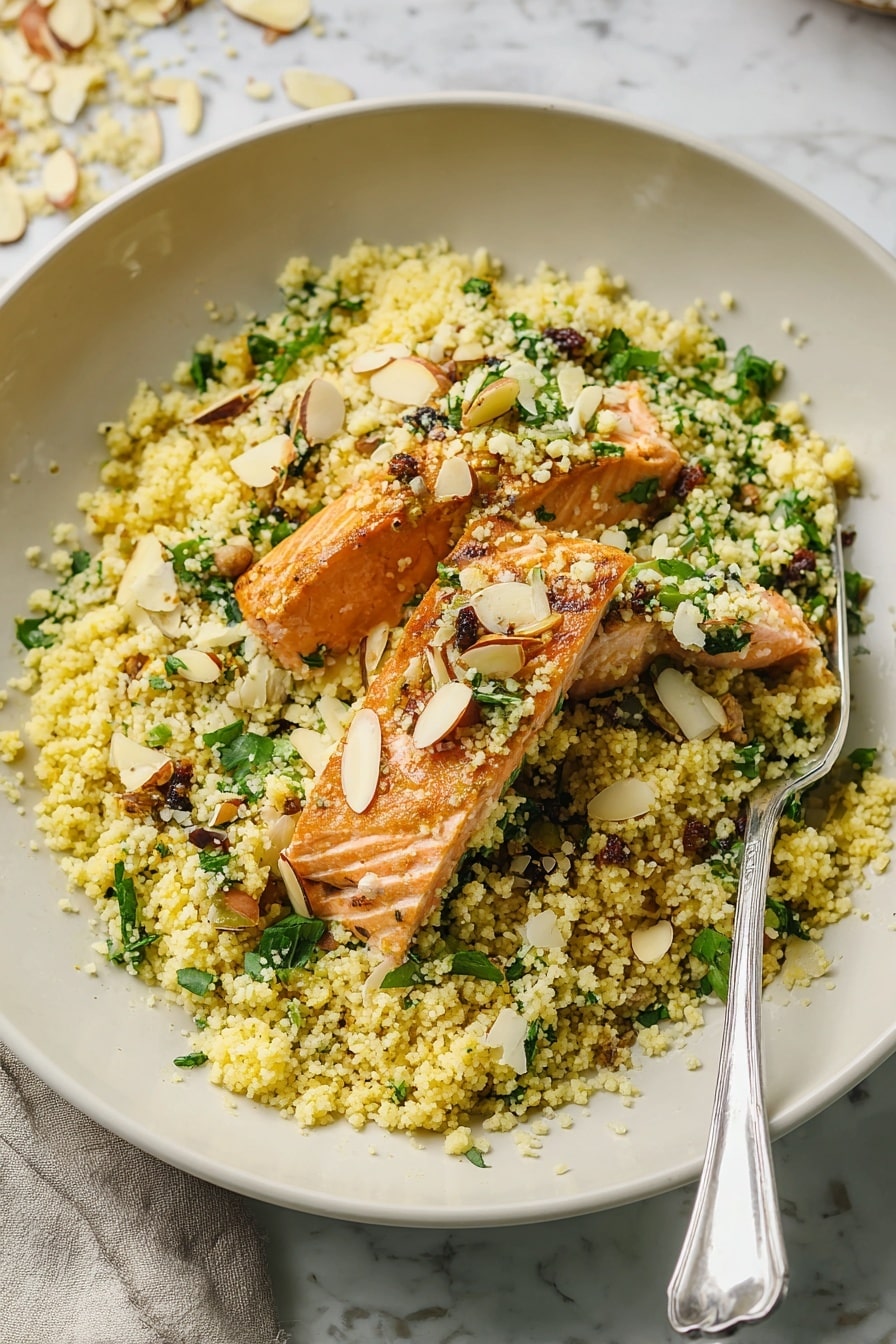
Garnishes
I love sprinkling extra fresh cilantro on top right before serving—it adds a fresh pop of color and flavor. Sometimes, I add a few thin lemon slices or a dusting of additional ras el hanout for a beautiful, fragrant finish. If you want a bit of heat, a light drizzle of harissa or a sprinkle of crushed red pepper flakes works wonders.
Side Dishes
This dish stands wonderfully on its own, but I often serve it with a simple cucumber and tomato salad dressed with lemon and olive oil for a refreshing contrast. Roasted vegetables like carrots or asparagus also pair beautifully and add extra texture and color.
Creative Ways to Present
Whenever I’m hosting, I love to serve the couscous in small, charming bowls topped with the salmon fillet laid on top, garnished with a sprig of cilantro and a wedge of lemon. It makes a colorful, inviting presentation that feels festive without fuss. For casual dinners, a generous heap on a plate works perfectly!
Make Ahead and Storage
Storing Leftovers
Leftover couscous and salmon keep well in the fridge for up to 2 days. I found storing them separately in airtight containers preserves texture better—salmon tends to soften if sitting on the couscous. When refrigerated properly, leftovers still taste fresh and delicious.
Freezing
I’ve frozen cooked salmon before with decent results, but for this recipe, I recommend freezing the couscous and salmon separately in sealed containers or freezer bags. The couscous freezes well up to a month, and when thawed gently, retains its texture. Salmon is best eaten fresh, but can be frozen up to 1 month for convenience.
Reheating
To reheat, gently warm the couscous on the stovetop with a drizzle of olive oil or a splash of broth to bring life back to it. For the salmon, I prefer reheating it in a low-temperature oven or covered skillet over medium heat until warmed through, which helps keep it from drying out.
FAQs
-
Can I use canned or quick-cooking couscous instead of Moroccan couscous?
Yes, you can use other types of couscous, but Moroccan couscous is preferred here because of its smaller granules, which absorb flavors quickly and cook fast, helping keep the dish within 30 minutes.
-
What if I don’t have ras el hanout—can I substitute it?
If you don’t have ras el hanout, a spice blend of cumin, coriander, cinnamon, turmeric, and a pinch of allspice can work. Just adjust to your taste and keep it mild to replicate the warm, earthy profile.
-
How do I know when the salmon is perfectly cooked?
Look for salmon that flakes easily with a fork but still feels moist inside. Using a thermometer to check for 120°F internal temperature is the safest bet for tender, juicy salmon without overcooking.
-
Can this recipe be made gluten-free?
Traditional couscous is made from wheat, so it’s not gluten-free. However, you can swap in gluten-free alternatives like quinoa or millet for a similar texture and still enjoy all those delicious Moroccan flavors.
Final Thoughts
When I first tried this 30-Minute Moroccan-Spiced Salmon and Couscous Recipe, I was amazed at how something so quick could taste so complex and comforting. It’s one of those dishes that feels like a treat but is surprisingly simple to put together. Whether you’re cooking for yourself, your family, or friends, this recipe brings warmth, vibrant flavor, and a touch of elegance to the table without spending hours in the kitchen. Trust me, once you try it, you’ll be hooked—and I can’t wait for you to enjoy it as much as I do!
Print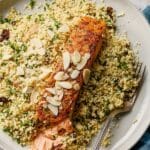
30-Minute Moroccan-Spiced Salmon and Couscous Recipe
- Prep Time: 10 minutes
- Cook Time: 20 minutes
- Total Time: 30 minutes
- Yield: 4 servings
- Category: Main Course
- Method: Baking
- Cuisine: Moroccan
- Diet: Low Salt
Description
This quick and flavorful 30-minute Moroccan-Spiced Salmon and Couscous recipe features tender salmon fillets seasoned with aromatic Ras el Hanout and served over fluffy Moroccan couscous mixed with almonds, cilantro, and dried fruit. Perfect for a nutritious and vibrant dinner, it combines warm spices, zesty lemon, and sweet accents for a delightful balance.
Ingredients
Salmon
- 4 (6oz) salmon fillets (skin on or off)
- 2 Tbsp extra virgin olive oil
- 1 lemon, zested and juiced (about 2 tsp lemon zest and 4 Tbsp lemon juice, divided between the salmon and couscous)
- 1 tsp ras el hanout
- 1 tsp Kosher salt
Couscous
- 2 Tbsp olive oil
- 2 shallots, thinly sliced into half moons
- 2 garlic cloves, finely chopped
- 1½ cups (90g) Moroccan couscous
- 1½ cups low-sodium chicken broth or vegetable broth, warmed
- ½ cup sliced almonds
- ½ cup fresh cilantro, roughly chopped (plus more for serving)
- ⅓ cup raisins or dried cranberries
Instructions
- Cook the salmon: Preheat the oven to 350°F. Pat the salmon fillets dry with a paper towel and place them on a parchment-lined baking sheet. In a small bowl, whisk together 2 Tbsp olive oil, 2 Tbsp fresh lemon juice, 1 tsp ras el hanout, and 1 tsp Kosher salt. Brush this mixture over the top of the salmon fillets evenly. Bake in the preheated oven for 12-15 minutes, depending on the thickness, until the internal temperature reaches 120°F and the salmon is tender and flaky.
- Cook the couscous: While the salmon is cooking, heat 2 Tbsp olive oil in a saucepan over medium-high heat. Add sliced shallots and sauté for 2-3 minutes until softened. Add chopped garlic and cook for another 1 minute. Stir in the Moroccan couscous, then pour in the warm chicken or vegetable broth. Stir once and cover the saucepan with a tight-fitting lid. Remove from heat and let it sit for 5-7 minutes until the liquid is fully absorbed.
- Finish the couscous: Fluff the couscous lightly with a fork. Add 2 tsp lemon zest, 2 Tbsp fresh lemon juice, ½ cup sliced almonds, ½ cup chopped cilantro, and ⅓ cup raisins or dried cranberries. Stir well to combine. Taste and adjust the seasoning if needed. Optionally, add 1-2 Tbsp olive oil to moisten and add richness to the couscous.
- Assemble and serve: Spoon the couscous onto serving plates and top each with a baked salmon fillet. Garnish with additional fresh cilantro. Serve immediately to enjoy the tender, spiced salmon and the flavorful couscous.
Notes
- This Moroccan-Spiced Salmon is tender, flaky, and richly flavored with Ras el Hanout, a Moroccan spice blend that offers a warm, nutty, and earthy flavor without heat.
- The sweet and savory combination of the salmon with fruity couscous is a classic pairing that works beautifully together.
- You can substitute raisins with dried cranberries or another dried fruit of your preference for added sweetness and texture.
- Gluten-free option: Use gluten-free couscous or substitute with quinoa.
- This dish is dairy-free and suitable for a wholesome weeknight or special occasion meal.
Nutrition
- Serving Size: 1 salmon fillet with couscous
- Calories: 282 kcal
- Sugar: 8 g
- Sodium: 87 mg
- Fat: 13 g
- Saturated Fat: 2 g
- Unsaturated Fat: 9 g
- Trans Fat: 0 g
- Carbohydrates: 15 g
- Fiber: 3 g
- Protein: 39 g
- Cholesterol: 109 mg

